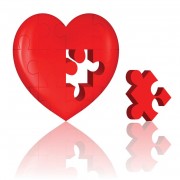How to deal with heart holes
Though they can sometimes close spontaneously, atrial septal defects often require surgery

Atrial septal defects (ASDs), a type of heart holes, are among the most frequent forms of congenital heart disease seen in adult cardiology clinics, affecting up to 58 percent of heart patients in Singapore. ASD is a collection of conditions, including primum, secundum and sinus venosus types, as well as unroof coronary sinus syndrome.
Majority of patients with secundum ASD, the most common type, have no symptoms, according to Dr Loh Yee Jim, a cardiothoracic surgeon at Mount Elizabeth Hospitals in Singapore. “The diagnosis is usually made after the discovery of an incidental murmur, abnormal ECG findings or an enlarged heart on chest x-rays. Occasionally patients can also present with palpitations, shortness of breath or chest discomfort. There is a strong tendency for the frequency of symptoms to increase with age,” he said.
Diagnosis can be confirmed with a 2D echocardiography of the heart. At this time it is important to assess the drainage of the pulmonary veins and their relationship to the ASD. “The most common type of partial anomalous pulmonary venous drainage is associated with a sinus venosus defect. This can be confirmed with a CT scan of the thorax,” Dr Loh added.
Spontaneous closure of ASDs occurs most often in small defects under 3mm in diameter. It also occurs frequently within the first year of life. However, an ASD can increase in size over time. The causes of this increase in size and the rate of increase are unknown. In one study, 65 percent of the defects enlarge, sometimes considerably.
Treatment is required whenever the patient develops symptoms or when the defect has grown in size.
“Treatment options for ASDs include device closure and surgery. Surgery is indicated for patients who are deemed unsuitable for device closure, especially for patients with inadequate muscle rims around the ASD," Dr Loh said.
“Some patients have concomitant cardiac lesions that require surgery, others have had a failed attempt at device closure, and a smaller proportion of patients have ASDs other than the secundum. These will require complex open-heart surgery to repair the defect.”
Minimally invasive treatment options are available for less painstaking procedures, including minimally invasive procedures such as video-assisted thoracoscopic (VATS) surgical closure and robotic assisted closure of the heart defect. Each has its pros and cons and the patient will need to discuss these with a congenital heart surgeon.
"VATS ASD closure is done totally endoscopically and is one of the most minimally invasive cardiac surgical procedure. Each incision is no larger than 2-3 cm in its maximal length. The defect is then closed after putting the patient on a heart-lung machine for support,” said Dr Loh.
After the procedure, patients are sent to intensive care for overnight monitoring. Most patents will move to a general ward shortly afterwards, where they will stay for a further four to six days.
Patients usually follow up shortly after discharge for wound care. A repeat 2D echocardiography will be done a month later, and at six months, to ensure that any residual defect has closed.
“Patients who have undergone successful treatment are at no greater risk of heart disease later on in life, but those who have not been treated for closure are more likely to have it,” said Dr Loh. “After treatment, patients have an excellent prognosis and can expect long-term wellness.”
Dr Loh Yee Jim is a cardiothoracic surgeon practising at Mount Elizabeth Novena Hospital. His research interests lie in paediatric cardiology and cardiac surgery, adult heart surgery and endoscopic vein harvesting. He has been in medical practice for two decades and was trained in paediatric cardiothoracic surgery at the Boston Children’s Hospital, an affiliate of the Harvard Medical School.
Related Articles
Why laughter may not be the best medicine
Dr Julian K.B. Tan, an interventional cardiologist at Mount Elizabeth Hospital, explains the how strong emotions may affect the heart
Read moreWhat is a heart attack?
Dr Paul Chiam discusses the importance of seeking treatment quickly in the case of a heart attack
Read moreLatest Articles
Medical Care
Clinical Exercise Physiologist (CEP): The Emerging of Exercise is Medicine
How Exercising can be a Medicine
Read moreMedical Care
Reversing type 2 Diabetes: Embracing Hope and Determination
Experience the remarkable journey of Ash and his grandfather Atok as they conquer type 2 diabetes through unconventional methods, showcasing the power of love and determination over adversity.
Read moreMedical Care
Bladder Cancer: What You Need to Know
Empower yourself with our comprehensive guide to bladder cancer. Explore symptoms, diagnosis, treatments, and supportive resources to safeguard your health.
Read more